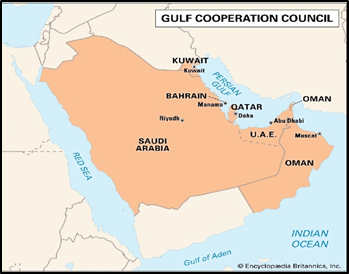In News:
- India and the Gulf Cooperation Council (GCC) member countries are expected to start negotiations for a free trade agreement next month.
What’s in Today’s Article:
- Gulf Cooperation Council (GCC)
- News Summary
Gulf Cooperation Council (GCC)

- The Gulf Cooperation Council (GCC) is a political and economic alliance of six countries in the Arabian Peninsula.
- These six countries are: Bahrain, Kuwait, Oman, Qatar, Saudi Arabia and United Arab Emirates.
- Established in 1981, the GCC promotes economic, security, cultural and social cooperation between the six states.
- It holds a summit every year to discuss cooperation and regional affairs.
Significance of GCC for India
- Energy Security
- Together, the GCC countries possess almost half of the world’s oil reserves.
- Currently, GCC suppliers account for around 34% of India’s crude imports.
- Trade and investments
- Currently, the region is expanding beyond the energy sector into other fields, such as tourism, construction and finance.
- This opens up the opportunities for trade and investments for countries like India.
- Presence of Indian Diaspora
- Indian diaspora in the Middle East accounts for around 7.6 million people.
- As per the RBI report, remittances sent from this region stands to be around 30% of the total remittances received by India from abroad.
- Geostrategic
- GCC countries sit across the Persian Gulf, which is an important sea lane for global trade.
- From the strategic point of view, India and GCC share the desire for political stability and security in the region.
News Summary
- India is likely to start next month, negotiations with the Gulf Cooperation Council for a free trade agreement.
- This FTA will be aimed at boosting economic ties between the regions. It will also be a shot in the arm for India’s ambition to significantly shore up its share in global exports.
Significance
- Huge untapped potential
- Experts believe, the GCC region holds huge trade potential and a trade pact will help in further boosting India's exports to that market.
- GCC is a major import dependent region. India can increase its exports of food items, clothing and several other goods.
- Sectors like chemicals, textiles, gems and jewellery and leather will get a major impetus by this agreement.
- Boost to already existing trade ties
- India's exports to the GCC stands at USD 44 billion in 2021-22 and imports for the same period stands at USD 110.73 billion.
- The share of GCC members in India's total imports rose to 18 per cent in 2021-22 from 15.5 per cent in 2020-21.
- Bilateral trade has increased to USD 154.73 billion in 2021-22 from USD 87.4 billion in 2020-21.
- India imports predominately crude oil and natural gas from the Gulf nations like Saudi Arabia and Qatar.
- It exports pearls, precious and semi-precious stones; metals; imitation jewellery; electrical machinery; iron and steel; and chemicals to these countries.
- Major source of remittances
- Gulf nations are host to a sizeable Indian population. Out of about 32 million non-resident Indians (NRIs), nearly half are estimated to be working in Gulf countries.
- According to a November 2021 report of the World Bank, India got USD 87 billion in foreign remittances in 2021.
- Of this, a sizeable portion came from the GCC nations.
- Good relationship with most of the countries in the region
- Saudi Arabia was India's fourth-largest trading partner last fiscal.
- From Qatar, India imports 8.5 million tonnes a year of LNG and exports products ranging from cereals to meat, fish, chemicals, and plastics.
- Kuwait was the 27th largest trading partner of India in the last fiscal, while the UAE was the third-largest trading partner in 2021-22.
- Boost to India’s own ambition of increasing its global trade
- India targets to ramp up exports of goods and services to $2 trillion by 2030.
- It also eyes to raise the share of its exports in global trade to 3% by 2027 and 10% by 2047 from the current 2.1%.
- At the same time, India is working towards promoting hundred Indian brands as global champions.










